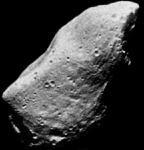StarChild Question of the Month for July 1999
Question:
Will an asteroid hit the Earth?

Answer:
 A number of recent movies have been about this subject. It is important to remember
that they are just movies and often times do not represent good or true science.
Sometimes, however, there is a tiny seed of truth behind a movie, although it
may be hard to tell what is true and what is fiction. This is the case for the
movies about asteroids
hitting the Earth.
A number of recent movies have been about this subject. It is important to remember
that they are just movies and often times do not represent good or true science.
Sometimes, however, there is a tiny seed of truth behind a movie, although it
may be hard to tell what is true and what is fiction. This is the case for the
movies about asteroids
hitting the Earth.
Let us say right away that at this moment, we know of nothing currently on
a collision course with Earth. Last year, it was announced in the news that
an asteroid was on a collision course with Earth and would hit in the year
2028. We now know that the calculations were in error and that asteroid
will miss the Earth completely. You can read more about this at
http://impact.arc.nasa.gov/news_detail.cfm?ID=60.
Keep in mind that the Earth has been hit before by asteroids and will be
again someday. We don't know when, but we do know it is not in the
immediate future.
Why are the chances of us being hit small?
Our solar system is very big compared to the size of the Earth, which means
that the chance that the Earth will be hit by another solar system object
such as an asteroid is very small.
Once in awhile, it happens. But not very often.
Think about this, most of the asteroids in our solar system are located in
the asteroid belt. Yet we have been able to send spacecraft such as Voyager
I and II, as well as others, through this belt without any problems. Why?
There is more "empty space" in the belt than asteroids!
How often do we expect the Earth to be hit?
The asteroids capable of causing a global disaster if they hit the Earth
are extremely rare. They probably would need to be about a kilometer or
more in diameter. Such bodies impact the Earth only once every 100,000
years on average. Other objects of a similar size, such as comets, impact
even less frequently, perhaps once every 500,000 years or so.
If we discover an object that will collide with Earth's, what could be done
about it?
If astronomers find such an object, there would be plenty of time to track
it, measure its orbit precisely, and plan a system for deflecting it from
its current orbital path. There would be no great hurry and no great panic.
It would be a project for all the world's nations to take part in. Because
we will have found it long before it actually intersects the Earth's orbit,
it probably would take only a small push (perhaps from chemical rockets we
land on the surface of the asteroid) to divert it from a threatening path.
Who is watching the skies?
There are agencies, NASA among them, which realize that although the Earth
is in no immediate danger, an asteroid impact is something that will pose a
problem sometime in the future. It is in the world's best interest not to
ignore this, but to be watchful in order to provide the maximum warning
time. You can find out more about some of the groups watching the sky for
potentially threatening objects at:
The Near Earth Asteroid Tracking Team -
http://neat.jpl.nasa.gov/
SpaceWatch -
http://www.lpl.arizona.edu/spacewatch/
The Asteroid and Comet Impact Hazard Group -
http://impact.arc.nasa.gov/

The StarChild site is a service of the
High Energy Astrophysics Science Archive
Research Center (HEASARC),
within the
Astrophysics Science Division (ASD) at
NASA/
GSFC.
StarChild Authors: The StarChild Team
StarChild Graphics & Music: Acknowledgments
StarChild Project Leader: Dr. Laura A.
Whitlock
Curator: J.D. Myers
Responsible NASA Official: Amber Straughn
![]()
 A number of recent movies have been about this subject. It is important to remember
that they are just movies and often times do not represent good or true science.
Sometimes, however, there is a tiny seed of truth behind a movie, although it
may be hard to tell what is true and what is fiction. This is the case for the
movies about asteroids
hitting the Earth.
A number of recent movies have been about this subject. It is important to remember
that they are just movies and often times do not represent good or true science.
Sometimes, however, there is a tiny seed of truth behind a movie, although it
may be hard to tell what is true and what is fiction. This is the case for the
movies about asteroids
hitting the Earth.
![]()